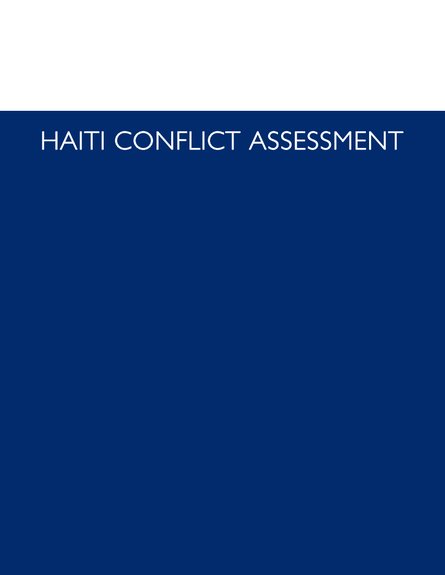
Modern Haiti stands at a crossroads. On the one hand, its progress and stability continue to be threatened by political exclusion, widespread youth unemployment, insufficient access to social services, and other longstanding “incentives” for violence. Additionally, the abundance of small arms and a large disenfranchised youth population provide ample resources for manipulation by criminal gangs, organized crime, Haiti’s economic elites, ex-FAD’H members and such political “outsiders” as former President Aristide. Haiti also continues to suffer from weak governing institutions and a history of violent political changes. Taken together, such factors could coalesce in a destabilizing mix during the critical but vulnerable first months of the new Préval Administration. On the other hand, the early months of the Préval Administration also constitutes a critical window of opportunity for the Government of Haiti and the international community to implement the programs and reforms that will be necessary for Haiti’s long-term economic health and stability. Haiti has historically suffered from weak governance stemming from an authoritarian political culture and public institutions monopolized by partisan loyalists for personal gain. Still, traditional family and religious networks served as a check on criminality and as enforcers of social norms. However, weak civil society institutions are increasingly being co-opted by political and economic interests, while family networks are being eroded by economic need. In turn, these conditions are fueling a growing rural exodus and the rise of criminality, including kidnappings and the drug trade. Ineffective state institutions provide little counterbalance to these challenges, while the cycle of winner-take-all politics provides continued motivation to manipulate disenfranchised youth and criminal groups for political ends. Such patterns of instability will continue unabated as long as Haiti’s economic resources continue to shrink, through environmental degradation and the stagnation of economic activities, while the pool of available recruits - unemployed, uneducated, and politically alienated youth - continues to grow. As long as various groups - both the marginalized and the powerful - feel systematically excluded, these ingredients for instability will periodically boil over into violence as various segments of society pursue extra-legal means to achieve their political and economic ends.
Resource collections
- UN Habitat - Urban Response Collection
- Urban Response - Urban Crisis Preparedness and Risk Reduction
- Urban Response Collection - Community Engagement and Social Cohesion
- Urban Response Collection - Economic Recovery
- Urban Response Collection - Environment and Climate Change
- Urban Response Collection - Housing, Land and Property
- Urban Response Collection - Urban Crisis Response, Recovery and Reconstruction
- Urban Response Collection - Urban Resilience